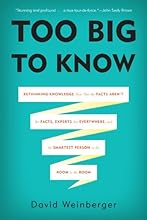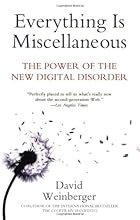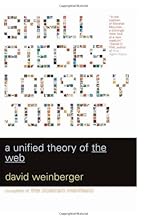Expert in Artificial Intelligence, Chatbots, and Ethics Related to Policy & Use; Fellow, Harvard’s Berkman Klein Center for Internet and Society
David Weinberger Biography
David Weinberger's twisty career began as a philosophy professor for six years, and then took a sharp turn when his many years as a freelance journalist and humor writer led him to a job in a high tech start-up as a marketing writer. That put him in a position to observe and participate in the early rise of the World Wide Web. He went on to become a Marketing VP and strategic marketing consultant to companies working at the heart of the Net revolution, including in early online search and very early social networking.
In 1999 he was a co-author of a seminal work in Internet business and marketing, "The Cluetrain Manifesto." He followed this with 2002's "Small Pieces Loosely Joined" that explained the appeal of the Web as a more faithful expression of human existence.
In 2004, he became a Fellow at Harvard's Berkman Klein Center, and then a senior researcher and founding member of the Fellows Advisory Board; he remains closely affiliated with the Center.
In 2007 he wrote "Everything Is Miscellaneous" about how the digital world is profoundly changing our ideas about how we organize our things and world. This led to becoming co-director of the Harvard Library Innovation Lab where for almost five years he led a team of developers creating groundbreaking, open library tech.
For 4.5 years, he co-directed the Harvard Library Innovation Lab, helping to establish Harvard as a leading innovator in that field.
He has twice been a writer-in-residence at Google, working with AI teams to explore and explain the impact of machine learning, co-creating a 9-part podcast walking through the development of a machine learning application, and writing brief fiction to illustrate the complexity of the moral problems facing AI.
He was a Franklin Fellow at the U.S. State Department 2009-2011, working with the e-Diplomacy group on social networking software. In 2015 he was a Harvard Shorenstein journalism fellow where he documented the use of open platforms by news media.
2012's "Too Big to Know" explored how the movement of knowledge onto the Web is resulting in knowledge taking on the properties of networks, escaping the limitations of paper bound into books.
His most recent book, the award-winning "Everyday Chaos" (HBR, 2019), presents a unique perspective on the rise and importance of machine learning.
His work has been published many times in Wired and Harvard Business Review, as well as in Scientific American, The NY Times, Washington Post, and many, many more. He has given hundreds of keynote speeches around the world, including recently on what ethics can learn from AI and the shift in our most ancient strategies for thriving as citizens and businesspeople.
David has a Ph.D. in philosophy from the University of Toronto, and was given an honorary doctorate of letters from Simmons College.
Contact a speaker booking agent to check availability on David Weinberger and other top speakers and celebrities.
David Weinberger Speaking Topics
-
AI and Ethics
While AI raises important ethical issues that business must take seriously, in this one-of-a-kind workshop David has business managers probe beneath the tech to see how those issues arise from the very nature of machine learning, how to address them, and how AI is changing our ideas about what's fair and ethical.
Takeaways: Understand why bias is machine learning's “original sin.” Learn how our engagement with AI is forcing us to confront issues in our current idea of fairness. In a series of vivid hypotheticals, work through the trade-offs implementing AI systems demand of us.
-
Everything is Miscellaneous: The Power of the New Digital Disorder
For thousands of years, we've organized our ideas the same way we've organized our laundry, separating them into neat piles. In the digital age, this unnecessary limitation keeps companies from getting maximum value from their knowledge and frustrates customers.
In this talk, we look at the four new principles of organization and how businesses are learning that they do best if they include every piece of information they can find and allow their customers to organize the information the way that works for them.
The audience learns:
- How to get more value from organizational knowledge
- Why customers are rejecting traditional authorities, including businesses and the media and who they are learning to trust
- The 4 new principles for organizing ideas and information
David Weinberger Videos

NERD 2024 Keynote David Weinberger
We are thrilled to announce that our keynote speaker for Friday will be David Weinberger. David has been writing about the effect of technology on...



-
How do I book David Weinberger to speak at my event?
Our experienced booking agents have successfully helped clients around the world secure speakers like David Weinberger for speaking engagements, personal appearances, product endorsements, or corporate entertainment since 2002. Click the Check Availability button above and complete the form on this page to check availability for David Weinberger, or call our office at 1.800.698.2536 to discuss your upcoming event. One of our experienced agents will be happy to help you get speaking fee information and check availability for David Weinberger or any other speaker of your choice. -
What are the speaker fees for David Weinberger
Speaking fees for David Weinberger, or any other speakers and celebrities, are determined based on a number of factors and may change without notice. The estimated fees to book David Weinberger are $10,000 - $20,000 for live events and available upon request for virtual events. For the most current speaking fee to hire David Weinberger, click the Check Availability button above and complete the form on this page, or call our office at 1.800.698.2536 to speak directly with an experienced booking agent. -
What topics does David Weinberger speak about?
David Weinberger is a keynote speaker and industry expert whose speaking topics include Artificial Intelligence, Author, Business, Business Authors, Business Consulting, Business Growth, Creativity, Culture, Customer Experience, Data, Ethics & Integrity, Futurism, Innovation, Journalist, Leadership, Marketing, Sales, Science, Social Media, Strategic Leadership, Technology -
Where does David Weinberger travel from?
David Weinberger generally travels from Brookline, MA, USA, but can be booked for private corporate events, personal appearances, keynote speeches, or other performances. For more details, please contact an AAE Booking agent. -
Who is David Weinberger’s agent?
AAE Speakers Bureau has successfully booked keynote speakers like David Weinberger for clients worldwide since 2002. As a full-service speaker booking agency, we have access to virtually any speaker or celebrity in the world. Our agents are happy and able to submit an offer to the speaker or celebrity of your choice, letting you benefit from our reputation and long-standing relationships in the industry. Please click the Check Availability button above and complete the form on this page including the details of your event, or call our office at 1.800.698.2536, and one of our agents will assist you to book David Weinberger for your next private or corporate function. -
What is a full-service speaker booking agency?
AAE Speakers Bureau is a full-service speaker booking agency, meaning we can completely manage the speaker’s or celebrity’s engagement with your organization from the time of booking your speaker through the event’s completion. We provide all of the services you need to host David Weinberger or any other speaker of your choice, including offer negotiation, contractual assistance, accounting and billing, and event speaker travel and logistics services. When you book a speaker with us, we manage the process of hosting a speaker for you as an extension of your team. Our goal is to give our clients peace of mind and a best-in-class service experience when booking a speaker with us. -
Why is AAE Speakers Bureau different from other booking agencies?
If you’re looking for the best, unbiased speaker recommendations, paired with a top-notch customer service experience, you’re in the right place. At AAE Speakers Bureau, we exclusively represent the interests of our clients - professional organizations, companies, universities, and associations. We intentionally do not represent the speakers we feature or book. That is so we can present our clients with the broadest and best performing set of speaker options in the market today, and we can make these recommendations without any obligation to promote a specific speaker over another. This is why when our agents suggest a speaker for your event, you can be assured that they are of the highest quality with a history of proven success with our other clients.
David Weinberger is a keynote speaker and industry expert who speaks on a wide range of topics such as AI and Ethics, Everything is Miscellaneous: The Power of the New Digital Disorder, Web 2.0: The Myth and the Meaning, What Blogging is Not and The War against Customers What marketing can - and must - learn from the new connectedness. The estimated speaking fee range to book David Weinberger for your event is $10,000 - $20,000. David Weinberger generally travels from Brookline, MA, USA and can be booked for (private) corporate events, personal appearances, keynote speeches, or other performances. Similar motivational celebrity speakers are Terry Jones, Jim Carroll, Geoffrey Moore, R "Ray" Wang and Mike Walsh. Contact All American Speakers for ratings, reviews, videos and information on scheduling David Weinberger for an upcoming live or virtual event.
This website is a resource for event professionals and strives to provide the most comprehensive catalog of thought leaders and industry experts to consider for speaking engagements. A listing or profile on this website does not imply an agency affiliation or endorsement by the talent.
All American Entertainment (AAE) exclusively represents the interests of talent buyers, and does not claim to be the agency or management for any speaker or artist on this site. AAE is a talent booking agency for paid events only. We do not handle requests for donation of time or media requests for interviews, and cannot provide celebrity contact information.
If you are the talent and wish to request a profile update or removal from our online directory, please submit a profile request form.































